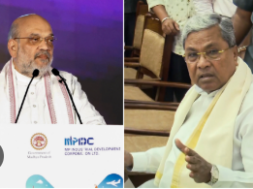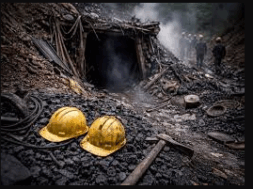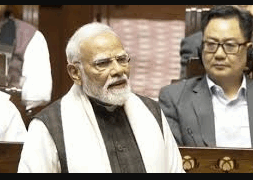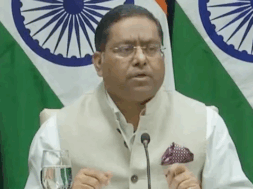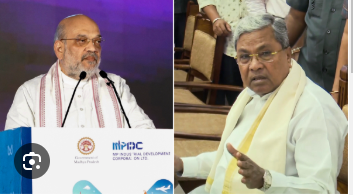
Non-BJP Leaders in Southern States Question Amit Shah’s Assurance on Delimitation
Manas Dasgupta
NEW DELHI, Feb 27: The non-BJP leaders from the Southern states have refused to take the union home minister Amit Shah’s assurance of not reducing any seats in the Lok Sabha in the new delimitation on the face value and has accused him of creating confusion among the people in these states.
The Karnataka chief minister Siddaramaiah, his Tamil Nadu counterpart MK Stalin, the DMK MP A Raja and several other non-BJP leaders sought clarifications from Mr Shah stating that his assurance on behalf of the Prime Minister Narendra Modi did not make it clear whether the number of seats in the northern states would not be increased on pro-rata basis which would put the southern states in disadvantageous position.
Mr Siddaramaiah on Thursday said Mr Shah’s claim that southern states would not be disadvantaged in the delimitation process was not trustworthy and it rather appeared to be aimed at creating confusion in the southern States.
“Looking at the extraordinary enthusiasm shown by Narendra Modi’s Union Government for delimitation, it appears that the real intent is to punish the people of the southern States for resisting his party’s dominance,” Mr Siddaramaiah said.
DMK MP A Raja dismissed the assurance and asked if the home minister could also assure that the seats of Uttar Pradesh, Madhya Pradesh, and Rajasthan would not go up. “He offers false assurances that the number of seats will not be reduced on a pro-rata basis. We seek clarification: will it be based on the population census or the existing constituencies of MPs and MLAs?” Raja questioned.
Mr Stalin, the DMK president and Tamil Nadu chief minister, charged that the push for a monolithic Hindi identity “killed ancient mother tongues.” Languages that gave space for Hindi eventually got lost without any trace, he claimed. In a social media post, Mr Stalin called upon “sisters and brothers from other States” and asked if they were aware as to how many Indian languages Hindi has “swallowed.” He went on to answer the question saying Bhojpuri, Maithili, Awadhi, Braj, Bundeli, Garhwali, Kumaoni, Magahi, Marwari, Malvi, Chhattisgarhi, Santhali, Angika, Ho, Kharia, Khortha, Kurmali, Kurukh, Mundari and many more were now “gasping for survival.”
The remarks came a day after Mr Shah said at a BJP programme in Coimbatore that the southern States would not lose a single Lok Sabha seat to delimitation. “Going by the Home Minister’s vague remarks, it seems that either he lacks proper information or there is a deliberate intent to disadvantage the southern States, including Karnataka, Telangana, Tamil Nadu, Kerala, and Andhra Pradesh,” Mr Siddaramaiah said.
If the Union Government genuinely wished to ensure fairness for the southern States, Mr Shah must clarify whether delimitation would be based on the latest population ratio or on the current number of Lok Sabha seats, Mr Siddaramaiah said. “It is evident that if delimitation is carried out based on the latest population ratio, it will be a severe injustice to the southern States,” he said. To prevent such unfairness, previous delimitation exercises were conducted using the 1971 census as the basis, following Constitutional amendments, he added.
Over the past 50 years, the southern States have effectively controlled population growth while progressing significantly in terms of development. Meanwhile, northern States such as Uttar Pradesh, Bihar, and Madhya Pradesh have failed to regulate population growth and continue to lag in development, the Chief Minister said.
“As a result, if delimitation is based on the latest census, southern States, including Karnataka, may see a reduction or stagnation in their number of Lok Sabha seats, while northern States will gain more seats. In either scenario, the southern States will bear the loss. Is the Home Minister unaware of this?” he asked.
Mr Stalin while contesting that the push for a monolithic Hindi identity was killing ancient mother tongues, he claimed that even Uttar Pradesh and Bihar were “never just Hindi heartlands” and that their “real languages are now relics of the past.” Mr Stalin, also the son of the late DMK patriarch and former Chief Minister M. Karunanidhi, said Tamil Nadu resisted because “we know where this ends.”
Sharing a few words in Tamil in his social media post, Mr Stalin said Tamil woke up and the culture of the Tamils was saved. “Some languages gave space for Hindi. Those languages got lost without any trace,” Mr Stalin said. He pointed out that in his state, even the political parties opposed to the DMK were against Hindi imposition.
Countering the BJP and its supporters’ argument that the three-language policy did not mandate Hindi or Sanskrit and that any regional language from India could be learnt as the third language, Mr Stalin pointed out that a look at the said formula in most States showed that Hindi or Sanskrit was given priority.
He further stated that barring the Union Territory of Andaman and Nicobar Islands, where there were Tamils, the Tamil language did not feature anywhere. “We cannot say how long it will last. In BJP-ruled Rajasthan, it came to light that Urdu teachers are replaced by Sanskrit teachers, which reflects language fascism. If Tamil Nadu accepts the three-language formula, as in the case of northern States, the mother tongue will be boycotted and a scheme for ‘Sanskritisation’ would be implemented in the future,” Mr Stalin alleged.
“Anna [former Chief Minister C.N. Annadurai] enacted a law to adopt a two-language policy half a century ago to ensure that in Tamil soil, there is no place for those who think of thwarting the Tamil culture and imposing Aryan culture through Sanskrit and Hindi,” he said.
Mr Stalin pointed out that Tamil was a classical, ancient language, citing the findings from Keeladi and other excavations, and that Tamil could not be destroyed through Hindi or by an indirect imposition of Sanskrit. “Then why are we opposing it? Periyar said through Hindi, Tamil won’t be destroyed, but Tamil culture would be destroyed. Recently vice-president Jagdeep Dhankhar had said the best way to conquer a territory is to overtake its culture, destroy its language. That is the policy of the BJP government at the Centre,” Mr Stalin alleged.
The present delimitation of parliamentary constituencies within states has been done on the basis of the 2001 census, under the provisions of the Delimitation Act, 2002. The 84th amendment of the Constitution in 2002 barred delimitation of constituencies till the first census conducted after the year 2026.
This would have ideally meant the census of 2031 since 2021 was when the last census was due. However, sources pointed to Section 82 of the Constitution, which does not bar census data preceding 2026, to be used for delimitation.
Article 82 refers to the readjustment (of constituencies) after each census. “Upon the completion of each census, the allocation of seats in the House of the People to the States and the division of each State into territorial constituencies shall be readjusted by such authority and in such manner as Parliament may by law determine,” Article 82 says.
The delayed 2021 census, if held before 2026, can then be used to start the process of delimitation, officials said. The 2021 census was delayed first on account of the Covid pandemic and then due to reasons unexplained by the Centre. There is no clarity at the moment as to when the census will be held.
The house listing and enumeration process is usually a year-long exercise. Training of enumerators has to be carried out before the census begins. “Most of our enumerators were trained for the 2021 census. Some have retired, so the new enumerators will have to be trained, which could take a few weeks,” a government functionary said.
The official also said since the census this time would be done electronically, it will be less time-consuming. However, the budget allocation in 2025 is also being seen as proof of the government remaining indecisive on the census. Budget 2025 allocated Rs 574.80 crore for the census. In 2021, when the decadal census was originally scheduled, Rs 3,768 crore was allocated. The cabinet in December 2019 had estimated that the 2021 census would cost about Rs 8,754 crore. For the next enumeration, officials estimate an expenditure of roughly Rs 12,000 crore.
One reason for the delay is the demand for a caste census. The opposition has upped the ante on the issue, which also has the support of BJP allies like the Janata Dal (United). Nitish Kumar, as part of the INDIA bloc, was one of the first chief ministers to undertake caste enumeration. Bihar goes to polls in the last quarter of 2025, and caste is a big factor in the state.
Caste enumeration is also a logistical nightmare for the government. As per the 1931 census, the total number of castes in India was 4,147. In the 2011 census, however, the number had gone up to almost 47 lakh. Government functionaries say that calculating the exact number of OBCs from such a huge sample is an almost impossible task. The challenge before the government is also to verify the caste of people. It is widely accepted that a surname defines one’s caste. But there are examples from Bihar, Punjab, and other parts where this formula is not applicable.
“Badals kept their name on the name of their village; Khanna is another example. Punjab is replete with such cases where the surname only signifies the village the person belongs to and not his or her caste. In Bihar, Kumar is used extensively. Two first names or only the first name is also used. Singh, Sinha, and Mishra are used by Bhumihars and also by Rajputs or Brahmins in parts of Bihar and UP. So the name alone can’t reveal what the caste of the person is,” a government functionary explained.
Government officials also pointed out that in the 2011 caste enumeration, almost 11 per cent of people in Maharashtra did not state their caste. The Bihar caste enumeration asked people to choose from 214 listed castes, but the union government, as per sources, feels that in a pan-India exercise, such a limited list can’t be drawn.
BJP functionaries feel DMK is raising the delimitation issue in light of the upcoming Tamil Nadu assembly elections next year. Political functionaries from southern parties, however, say the concern about delimitation is genuine. In the absence of a census, projected data is being relied upon to fuel the apprehension.
The seat ratio as per projected population shows that while states like UP might see manifold growth in the number of seats, the southern counterparts might gain far less. UP has 85 Lok Sabha seats currently. The projected population for 2025 is about 25 crore. If the current seat-to-population ratio is implemented post-delimitation, the total number of seats could go up to 250. Whereas Tamil Nadu, which currently has 39 seats, would only go up to 76 if the seat-to-population ratio is implemented. Bihar would go from 59 to 164, while Kerala will only gain 16 seats and go up to 36 from 20.
